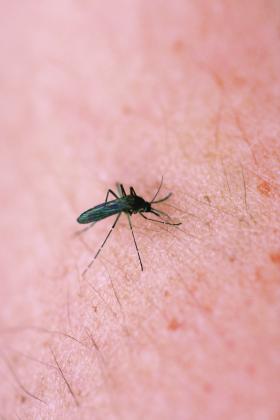Facts and figures about the tiny bugs
Typically, Florida mosquito species are most active in the spring and summer months, when warm temperatures combined with frequent, heavy rains produce thriving mosquito populations.
So the question is: Can mosquitoes carry the coronavirus?
The answer is: No.
“To date, there has been no information or evidence that suggests the new coronavirus could be transmitted by mosquitoes,” said Jeremy Lanier, spokesman for the Florida Department of Health in Osceola County.
The new coronavirus is a respiratory virus which spreads primarily through droplets generated when an infected person coughs or sneezes, or through droplets of saliva or discharge from the nose.
“To protect yourself, clean your hands frequently with an alcohol-based hand rub or wash them with soap and water,” Lanier said. “Also, avoid close contact with anyone who is coughing and sneezing.”
For a virus to pass to a person through a mosquito, the virus must be able to replicate inside the mosquito, according to The American Mosquito Control Association.
However the mosquito is often a carrier of diseases, such as malaria, dengue fever, encephalitis, yellow fever, West Nile virus, dog heartworm, and many others.
Controlling mosquitoes
Here’s some information from Osceola County Mosquito Control.
Mosquitoes around the home can be reduced significantly by minimizing the amount of standing water available for mosquito breeding.
Residents are urged to reduce standing water around the home in a variety of ways, including:
- Dispose of tin cans, plastic containers, ceramic pots or similar water-holding containers that have accumulated on your property.
- Empty standing water from used or discarded tires that may have accumulated on your property (e.g. tire swings).
- Drill holes in the bottom of recycling containers that are left out of doors.
- Clean clogged roof gutters on an annual basis, particularly if the leaves from surrounding trees have a tendency to plug up the drains.
- Turn over plastic wading pools when not in use.
- Turn over wheelbarrows and do not allow water to stagnate in birdbaths.
- Change water in birdbaths and wading pools on a weekly basis.
- Aerate ornamental pools or stock them with fish.
- Clean and chlorinate swimming pools that are not being used. Be aware that mosquitoes may even breed in the water that collects on swimming pool covers.
- Clean animal troughs weekly.
- Irrigate lawns and gardens carefully to prevent water from standing for several days.
Mosquito facts
According to Osceola Mosquito Control:
- Only the female bites to obtain a blood meal and that the male feeds on plant juices.
- Female mosquitos may live as long as three weeks during the summer and many months in the winter.
- All mosquitoes must have water in which to complete their life cycle.
- There are about 2,800 different species of mosquitoes.
- Most mosquitoes remain within 1 mile of their breeding site. A few species may range up to 20 miles or more.
- There are over 150 described species of mosquitoes from North America. Several species have been accidentally introduced from other parts of the world.
- Presently, the cues used by mosquitoes to find their hosts are poorly understood. Carbon dioxide (CO2), heat, octenol and light have been shown to be attractants. Other compounds tested such as lactic acid also have proved to attract certain species of biting insects.
- Mosquito is Spanish for "little fly."




